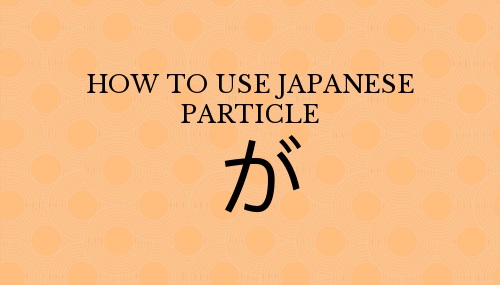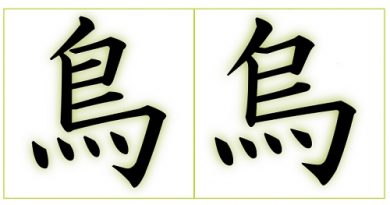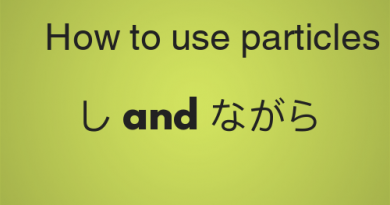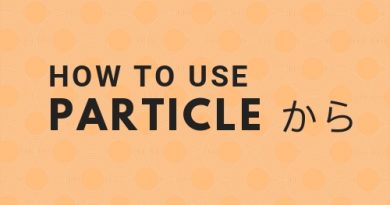How to use Japanese particle が
Hi, In this article, Learn Japanese daily will introduce to you How to use Japanese particle が.

Contents
- 1 How to use Japanese particle が :
- 2 1. Mention a new topic
- 3 2. Express existence
- 4 3. Used to arrange the content of 2 events
- 5 4. Used when two clauses of a sentence have opposite meaning.
- 6 5. Used in sentences when the subject is not defined
- 7 6. Used when verb in sentence is intransitive verb
- 8 7. Used when choosing from 2 subjects or events
- 9 8. Used in case: object sentence
- 10 9. Used when going with the verbs expressing feeling
- 11 10. Used at the end of the sentence when the speaker wants to speak softly or wants to summarize
- 12 11. Express your aspirations (use が in the end of sentence)
- 13 12. Used to start the conversation
- 14 13. Use according to habits
How to use Japanese particle が :
1. Mention a new topic
来週中間テストがあります。
らいしゅうちゅうかんテストがあります。
There will be a midterm test next week.
雨が降っています。(When you notice or realize something for the first time, you need to use が)
あめがふっています。
It’s raining.
2. Express existence
私の家のそばに池がある。
わたしのいえのそばにいけがある。
There is a pond near my house.
テーブルの上に猫がいる。
ていぷるのうえにねこがいる。
There is a cat on the table.
3. Used to arrange the content of 2 events
性格もいいが、きれいな女です。
せいかくもいいが、きれいなおんなです。
She is beautiful and has good character.
僕はコーヒーにしますが、あなたは?
ぼくはこうひいにしますが、あなたは。
I drink coffee, what about you?
4. Used when two clauses of a sentence have opposite meaning.
日本語は難しいですが、とても面白いです。
にほんごはむずかしいですが、とてもおもしろいです。
Japanese is difficult but interesting.
薬を飲みましたが、熱が下がりません。
くすりをのみましたが、ねつがさがりません。
I took the medicine, but my fever did not go down.
5. Used in sentences when the subject is not defined
スポーツの中で何が一番好きですか。
スポーツのなかでなにがいちばんすきですか。
What do you like best in sports?
クラスで誰が一番背が高いですか?
くらすでだれがいちばんせがたかいですか。
Who is the tallest in the class?
6. Used when verb in sentence is intransitive verb
ある女性雑誌に目が留まった。
あるじょせいざっしにめがとまった。
My eyes looked at a women’s magazine
ドアに鍵がかかっている。
どあにかぎがかかっている。
The key is on the door
7. Used when choosing from 2 subjects or events
日本は韓国とはどちらが行きたいんですか。
にほんはかんこくとはどちらがいきたいんですか。
Which country would you like to go, Japan or Korean?
東京とソウルと、どちらが寒いですか。
とうきょうとそうると、どちらがさむいですか。
Which is colder, Tokyo or Seoul?
8. Used in case: object sentence
Hope, desire:
今日アイスクリームが食べたい。
Today, I want to eat ice-cream.
私は水が飲みたいです。
I want to drink water.
Ability:
彼は日本語と英語ができる。
かれはにほんごとえいごができる。
He can speak Japanese and English.
あなたは車の運転ができますか?
あなたはくるまのうんてんができますか。
Can you drive a car?
Capacity:
その子は外国語がよく歌えて、踊ることも上手です。
そのこはがいこくごがよくうたえて、おどることもじょうずです。
That child can sing well in foreign language and is good at dancing.
あなたは韓国語がわかりますか?
あなたはかんこくごがわかりますか。
Do you understand Korean?
9. Used when going with the verbs expressing feeling
となりの部屋から赤ちゃんの泣き声が聞こえた。
となりのへやからあかちゃんのなきごえがきこえた。
I heard a baby cry from the room next door.
昨日, 図書館で彼女が見えました
きのう、とそかんでかのじょがみえました。
Yesterday I saw her in the library.
10. Used at the end of the sentence when the speaker wants to speak softly or wants to summarize
すみません、ちょっとお願いがあるんですが、
すみません、ちょっとおねがいがあるんですが、
Excuse me, but I have a request…
11. Express your aspirations (use が in the end of sentence)
もう一度彼と付き合いが、
もういちどかれとつきあいが、
If only I could meet him again …
12. Used to start the conversation
私の部屋なんですが、大きい空き箱がある。
わたしのへやなんですが、おおきいあきばこがある。
About my room, there is a big empty box.
ミンですが、 やまもとさん、いらっしゃいますか?
みんですが、やまとさん、いらっしゃいますか?
I’m Min, is Mr. Yamato there?
13. Use according to habits
あいつらの命はどうなっているが、私には関係ないだろう。
あいつらのいのちはどうなっているが、わたしにはかんけいないだろう。
What happened to their lives doesn’t relates to me.
すみまぜんが…
Excuse me….
Above is how to use particle が. Please learn other particles in Japanese particles on Learn Japanese daily.
Wish you study well !


